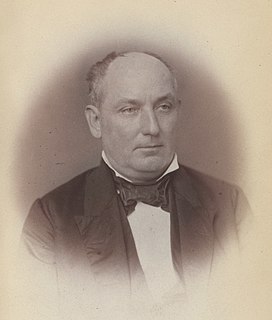A Quote by James Henry Hammond
The moment this House undertakes to legislate upon this subject slavery, it dissolves the Union. Should it be my fortune to have a seat upon this floor, I will abandon it the instant the first decisive step is taken looking towards legislation of this subject. I will go home to preach, and if I can, practice, disunion, and civil war, if needs be. A revolution must ensue, and this republic sink in blood.
Related Quotes
Disunion and civil war are at hand; and yet I fear disunion and war less than compromise. We can recover from them. The free States alone, if we must go on alone, will make a glorious nation. Twenty millions in the temperate zone, stretching from the Atlantic to the Pacific, full of vigor, industry, inventive genius, educated, and moral; increasing by immigration rapidly, and, above all, free--all free--will form a confederacy of twenty States scarcely inferior in real power to the unfortunate Union of thirty-three States which we had on the first of November.
Strictly speaking, one cannot legislate love, but what one can do is legislate fairness and justice. If legislation does not prohibit our living side by side, sooner or later your child will fall on the pavement and I'll be the one to pick her up. Or one of my children will not be able to get into the house and you'll have to say, "Stop here until your mom comes here." Legislation affords us the chance to see if we might love each other.
Approaching subject matter to photograph is like meeting a person and beginning a conversation. How does one know ahead of time where that will lead, what the subject matter will be, how intimate it will become, how long the potential relationship will last? Certainly, a sense of curiosity and a willingness to be patient to allow the subject matter to reveal itself are important elements in this process.
All that rejection from Republicans has a bit of a racist element. It was very necessary to have a black president, and it's been a great thing. It will help, in the end, to ease the trauma of slavery and civil war. The war against slavery cost almost 800,000 American lives - that's how strongly they felt about it. And it's not going to go away in a century.
Cartier-Bresson has said that photography seizes a 'decisive moment', that's true except that it shouldn't be taken too narrowly...does my picture of a cobweb in the rain represent a decisive moment? The exposure time was probably three or four minutes. That's a pretty long moment. I would say the decisive moment in that case was the moment in which I saw this thing and decided I wanted to photograph it.

































